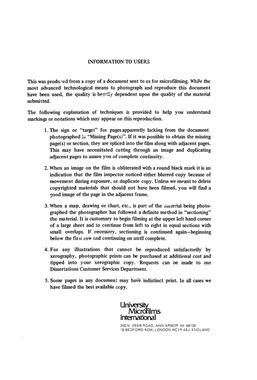| dc.contributor.author | Winter, Voncille A., | en_US |
| dc.date.accessioned | 2013-08-16T12:28:00Z | |
| dc.date.available | 2013-08-16T12:28:00Z | |
| dc.date.issued | 1980 | en_US |
| dc.identifier.uri | https://hdl.handle.net/11244/4712 | |
| dc.description.abstract | The following conclusions were drawn: (1) there is a significant difference in the knowledge of home-buying consumers in their prepurchase status and their postpurchase status; (2) there is a significant difference in the amount of knowledge gained by experienced home-buying consumers and inexperienced home-buying consumers; (3) there is no significant difference in the amount of knowledge gained as indicated by the sex of the home-buying consumer, by the use or nonuse of a broker, or by the pressure the family was under to obtain housing; (4) there is a correlation between the amount of knowledge gained and the satisfaction/dissatisfaction, family life cycle position, age, cost of home purchased, number of visits to prospective home, education, marital status, home search period, employment, and previous home ownership of the survey respondents (variables listed in descending order by degree of correlation); (5) independent variables identified are not accurate determinants of the amount of knowledge gained; (6) factors (subsets of characteristics) that appear to have the most predictive ability of "knowledge gained" are: (a) experience, (b) previous knowledge, (c) visits to property, (d) broker-assisted shopping, and (e) family-shopping; (7) communality among independent variables is very high, with highest communality values being assigned to variables of: age, family life cycle position, pressure to move, education, and previous home ownership. | en_US |
| dc.description.abstract | This study involved the identification and evaluation of the knowledge acquired by home-buying consumers as a result of the home-buying process. A sample of 142 was defined from a population of 1,996 home purchasers whose deeds were recorded in the counties of Oklahoma, Cleveland, and Canadian counties in Oklahoma, during August, 1977. | en_US |
| dc.description.abstract | The Chi-Square Test of Independence was used for testing hypotheses relating to Research Objective I, the Chi-Square Tests or Correlation were used for testing hypotheses relating to Research Objective II, and Multiple Discriminant Analysis and Factor Analysis were used for testing hypotheses relating to Research Objective III. | en_US |
| dc.description.abstract | The problem was stated as: "What knowledge do home-buying consumers acquire during the home-buying process that would have been valuable as prepurchase knowledge?" Three research objectives were identified for this complex problem: (1) knowledge gained by different groupings of the respondents, (2) relationship of certain characteristics of the respondents to the knowledge gained by the respondents, (3) interrelationships of the characteristics of the respondents as determinants of the knowledge gained, and identification of the subsets of characteristics with the best predictive ability of the knowledge gained. | en_US |
| dc.format.extent | vii, 184 leaves : | en_US |
| dc.subject | Economics, Commerce-Business. | en_US |
| dc.title | A study of the knowledge gained through the process of home purchasing by a select group of postpurchase home-buying consumers. | en_US |
| dc.title.alternative | A study of the knowledge gained through the process of home purchasing ... | en_US |
| dc.type | Thesis | en_US |
| dc.thesis.degree | Ph.D. | en_US |
| dc.thesis.degreeDiscipline | Jeannine Rainbolt College of Education | en_US |
| dc.note | Source: Dissertation Abstracts International, Volume: 41-02, Section: A, page: 0747. | en_US |
| ou.identifier | (UMI)AAI8016938 | en_US |
| ou.group | Jeannine Rainbolt College of Education | |
